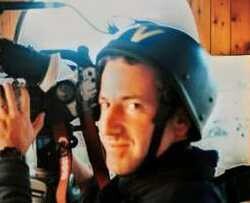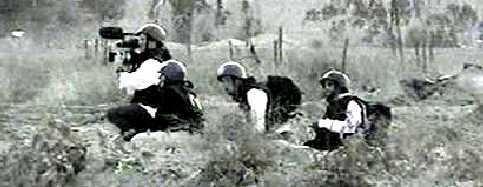7 May 2003

A photo handed out May 3, 2003 shows freelance British cameraman James Miller a day before he was killed in the Rafah refugee camp in the southern Gaza Strip.
Miller, an award-winning documentary filmmaker, was with a crew in the town of Rafah in southern Gaza near the Egyptian border filming an HBO documentary on the Israeli-Palestinian conflict. That evening, he and his four-person crew were in a Palestinian home filming the army’s demolition of houses in the area that the Israeli army alleged contained tunnels used to smuggle arms.
Tamer Zeyara, a cameraman with The Associated Press Television News (APTN) who was filming in the same house, told CPJ that at about 11:30 p.m., the group decided to leave. Miller, his producer Saira Shah, and translator Abdul Rahman Abdullah attempted to identify themselves to the Israeli troops in the area, which were in armored personnel carriers, as they were leaving. Zeyara told CPJ that the Israeli troops were about 150 meters away from the house where they had been filming, but that he was unsure how close the journalists went to the troops once they left.

A frame from APTN which shows a British documentary film crew filming in Rafah, Friday May 2 2003. Freelance British journalist, Briton James Miller, seen here at left, holding camera filming youths earlier in the day, was shot and killed.
Zeyara said all the journalists were wearing jackets marked “TV,” as well as helmets, and that Abdullah waved a white flag while Miller used a flashlight to illuminate their marked jackets and the flag. As they approached the soldiers, the journalists shouted in English and Arabic that they were members of the media. The troops then fired three shots in their direction, Zeyara said, followed by a burst of gunfire. Miller was hit once in the neck. (The crew working with Miller has declined to speak with CPJ pending their own private investigation into the incident.)
The Associated Press wrote that APTN footage of the incident “showed the crew waving a white flag and yelling that they were British journalists as they approached an armored bulldozer conducting the operation.”
The Israeli army was quoted as saying that troops in the area returned fire after being fired on by rocket-propelled grenades. Zeyara denied there was any fire in the area at the time. On Sunday, the army said that Miller was struck by a bullet from behind, claiming that he may have been hit by Palestinian fire, but Zeyara dismissed this allegation.
“We demand a full and transparent investigation into this shocking incident,” said CPJ acting director Joel Simon. “The Israeli army must punish those responsible for James Miller’s death.”
Simon added, “We believe that the failure of Israeli authorities to conduct serious investigations and punish those who have harmed journalists in the past has fostered a climate of impunity and recklessness among Israeli troops, making indiscriminate fire acceptable.”
Miller is the second journalist to have been killed in the Occupied Territories during the last two weeks. APTN cameraman Nazeh Darwazeh was shot in the head by an Israeli soldier at close range while filming clashes between Palestinian youths and Israeli troops in central Nablus on April 19. Since May 2002, four journalists have been killed in the Occupied Territories-all by Israeli gunfire.
CPJ is a New York-based, independent, nonprofit organization that works to safeguard press freedom worldwide.
More information:
For further information, contact Joel Campagna (x 103) or Hani Sabra (x 104) at CPJ, 330 Seventh Ave., New York, NY 10001, U.S.A., tel: +1 212 465 1004, fax: +1 212 465 9568, e-mail: mideast@cpj.org; Internet: www.cpj.org